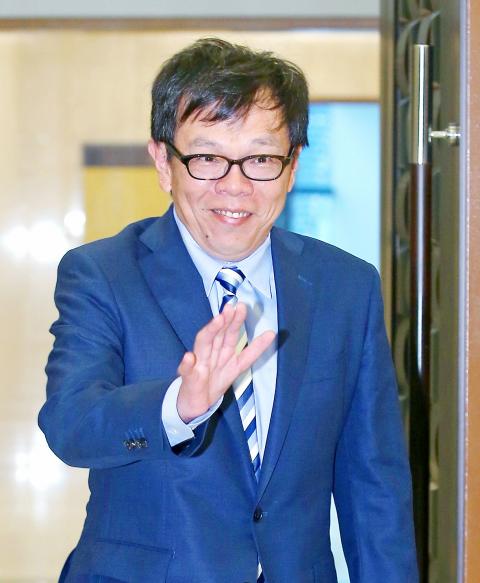Presidential Office Deputy Secretary-General Yao Jen-to (姚人多) was yesterday elected as vice chairman and secretary-general of the Straits Exchange Foundation (SEF).
Yao’s election was confirmed by the board of the foundation, spokeswoman Kuan An-lu (管安露) said.
Following his confirmation, Yao said he would work with the foundation’s staff to handle cross-strait affairs based on the principle of serving the interests of people on the both sides of the Taiwan Strait, Kuan said.

Photo: Fang Pin-chao, Taipei Times
Asked how Yao’s stance on Taiwanese independence might affect his job, Kuan said that politics should not influence people-to-people exchanges between Taiwan and China, adding that the two sides of the strait have engaged in exchanges for more than 30 years.
Taiwan has always kept an open mind about cross-strait exchanges and would not turn down opportunities for communication with pro-unification factions in China, Kuan said.
During a public forum in 2013, Yao, at the time an associate professor of sociology at National Tsing Hua University, said that Taiwanese independence had lost its place in the mainstream and urged the Democratic Progressive Party to facilitate democratization in China by promoting Taiwan’s experiences in furthering democracy, freedom and human rights.
Yao on Wednesday resigned from his Presidential Office position to take up the new role, Kuan said.
Yao is a capable person who would contribute to the positive development of cross-strait relations, foundation chairwoman Katharine Chang (張小月) said.
The foundation would in August or September set up a telephone hotline to provide information to young people who wish to study in China, she said.
It would also continue to improve its services for China-based Taiwanese businesses, Chinese spouses of Taiwanese and Chinese students in Taiwan, Chang added.
Additional reporting by staff writer

A preclearance service to facilitate entry for people traveling to select airports in Japan would be available from Thursday next week to Feb. 25 at Taiwan Taoyuan International Airport, Taoyuan International Airport Corp (TIAC) said on Tuesday. The service was first made available to Taiwanese travelers throughout the winter vacation of 2024 and during the Lunar New Year holiday. In addition to flights to the Japanese cities of Hakodate, Asahikawa, Akita, Sendai, Niigata, Okayama, Takamatsu, Kumamoto and Kagoshima, the service would be available to travelers to Kobe and Oita. The service can be accessed by passengers of 15 flight routes operated by

Alain Robert, known as the "French Spider-Man," praised Alex Honnold as exceptionally well-prepared after the US climber completed a free solo ascent of Taipei 101 yesterday. Robert said Honnold's ascent of the 508m-tall skyscraper in just more than one-and-a-half hours without using safety ropes or equipment was a remarkable achievement. "This is my life," he said in an interview conducted in French, adding that he liked the feeling of being "on the edge of danger." The 63-year-old Frenchman climbed Taipei 101 using ropes in December 2004, taking about four hours to reach the top. On a one-to-10 scale of difficulty, Robert said Taipei 101

Taiwanese and US defense groups are collaborating to introduce deployable, semi-autonomous manufacturing systems for drones and components in a boost to the nation’s supply chain resilience. Taiwan’s G-Tech Optroelectronics Corp subsidiary GTOC and the US’ Aerkomm Inc on Friday announced an agreement with fellow US-based Firestorm Lab to adopt the latter’s xCell, a technology featuring 3D printers fitted in 6.1m container units. The systems enable aerial platforms and parts to be produced in high volumes from dispersed nodes capable of rapid redeployment, to minimize the risk of enemy strikes and to meet field requirements, they said. Firestorm chief technology officer Ian Muceus said

MORE FALL: An investigation into one of Xi’s key cronies, part of a broader ‘anti-corruption’ drive, indicates that he might have a deep distrust in the military, an expert said China’s latest military purge underscores systemic risks in its shift from collective leadership to sole rule under Chinese President Xi Jinping (習近平), and could disrupt its chain of command and military capabilities, a national security official said yesterday. If decisionmaking within the Chinese Communist Party has become “irrational” under one-man rule, the Taiwan Strait and the regional situation must be approached with extreme caution, given unforeseen risks, they added. The anonymous official made the remarks as China’s Central Military Commission Vice Chairman Zhang Youxia (張又俠) and Joint Staff Department Chief of Staff Liu Zhenli (劉振立) were reportedly being investigated for suspected “serious